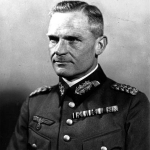Background
Otto von Stuelpnagel was born in Berlin on 16 June 1878.

Otto von Stuelpnagel was born in Berlin on 16 June 1878.
From 1898 a Lieutenant in the Second Prussian Infantry Guards Regiment, Otto von Stuelpnagel was on active service during World War I. After the armistice his extradition was demanded from Germany for crimes of murder and theft, but he was never brought to book.
A member of the so-called ‘nobility of the sword’, von Stuelpnagel was one of the most influential of the clique of Reichswehr officers who sought to destroy the Weimar Republic from behind the scenes. Already one of Hitler’s most devoted followers in the years before 1933, he was called out of retirement for special tasks and reappointed General of Infantry in 1940.
In October 1940 he was made Military Commander of France, occupying Laval’s château at Clermont- Ferrand.
Otto von Stuelpnagel was captured in Germany and brought to Paris for trial after the war. He committed suicide by hanging himself in his cell at the Cherche-Midi prison in Paris, while still awaiting trial, on 6 February 1948.
As Governor of the Greater Paris district, a post he held until February 1942, Otto von Stuelpnagel acquired the reputation of a brutal hangman, responsible for the death of many French patriots and the deportation to Germany of countless others. His proclamations ordering curfews, punishment and execution of hostages were bitterly resented by the local population. After the killing of a German officer in a Paris subway station, he ordered the execution of twenty-two hostages, whose deaths were announced to the French people on red posters. Following French underground activities in Bordeaux and Nantes, another fifty hostages were shot.
The terror reached its peak in the autumn and winter of 1941, with mass executions of Jews and communists taken from prison and murdered in a reprisal for actions against the occupying power.

